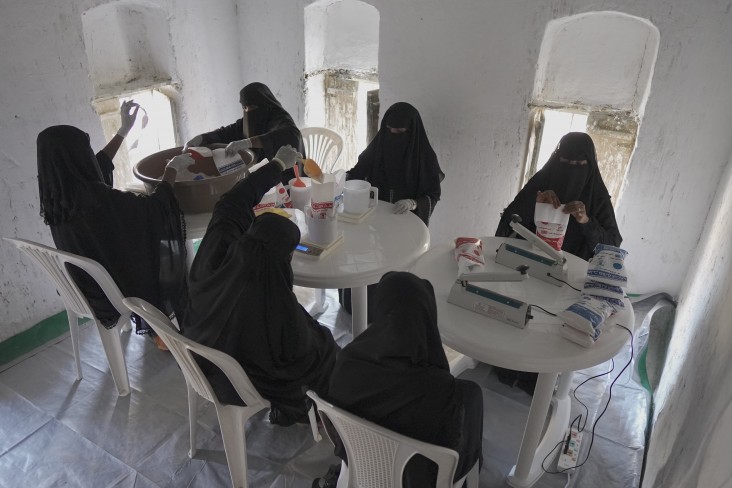Speeches Shim

Empowering Enterprising Coastal Women in Yemen
“This small room with a grinding machine is a great achievement for us. This is a salt factory. Now we can sell our refined, packaged salt to shops. We will make enough money to buy food for our families. We are very blessed.” -- Shala Ali, Member of Al Hissi Association
In the small seaside village of Mayfa, in Yemen’s Hadramawt Governorate, the whir of a salt grinding machine serves as the backdrop for the regular motions of six women gathered along a simple assembly line. Sitting in pairs around three plastic tables, they fill, measure, and seal small plastic bags of refined sea salt destined to be featured in the spice aisles of the region’s grocery stores, providing livelihoods for hundreds of local families.
These are the women of the Al Hissi Association for Sea Salt Production, which has been running as an officially registered organization since November 2019, thanks to support from USAID’s Yemen Economic Stabilization and Success (YESS) program. Employing more than 300 local women, along with a few men, Al Hissi is transforming a backbreaking tradition of salt harvesting into a groundbreaking operation for increasing incomes and employment in Yemeni coastal communities.
The gathering and sale of sea salt has long been the purview of coastal women in Yemen, and one of the very few employment options open to them. With the war, the number of female-headed households has risen sharply. For many families in Mayfa, salt harvesting has become the only source of income.
Traditionally, coastal women have harvested sea salt from small pools dug along the water’s edge, using their bare hands to scrape and collect the crystals that form as the seawater evaporates in the sun. Prior to the USAID technical assistance, the women would wash their harvested salt and dry it in the open air, where some 10-15 percent of it would be lost to spoilage from contamination. The women used to sell their raw salt in bulk for use in the production of ice (which freezes at lower temperatures when salt is added) or to local salt processors, fetching just two to three U.S. dollars per 50-kilogram bag.
Today, with technical support and training from USAID, the salt harvesting women of Mayfa have totally transformed their way of doing business, and Al Hissi has truly become a salt production enterprise. Instead of selling their unprocessed product as (low) price takers, they have modernized and mechanized their activity to produce a higher-quality, refined type of salt that is suitable for cooking – and far more lucrative. They offer their new table salt product in smaller batches – bags of 110 grams, 200 grams, and 500 grams. The bags sell for the equivalent of nine to ten U.S. dollars per 50 kilograms – representing a threefold increase over the previous prices.
“Before the intervention, we had nothing. No association to follow up with our requests, no basic equipment to run the salt business, no machine to grind the salt. We had to sell raw sea salt for a very low price,” says Shala Ali, who is now a proud member of the Al Hissi Association.
The Al Hissi Association’s transformation was facilitated by the USAID YESS project, which identified demand for refined sea salt as a growing market and worked with members to devise an action plan for improving their business productivity and profitability. The technical assistance focused on moving them from a supply-driven practice to a more sophisticated, demand-driven business model. The team also trained the women in methods to improve the efficiency of their salt extraction and reduce drudgery, supplying them with protective gloves and digging equipment. They conducted laboratory tests and technical training sessions on the procedures for refining and adding iodine to the salt to ensure it would meet quality standards for use as table salt, thereby expanding the range and value of their production. Twenty of the women were trained in processing and packaging, and a marketing expert worked with the association members to enhance their branding and identify new buyers for their improved products.
The full benefit of the increased sales and revenues on the livelihoods of the association’s members remains to be measured, as the organization is just getting started in its newly improved form. Al Hissi members are expected to multiply the value of their sales many times over compared to the past, thanks not only to higher per-kilo prices, but also to a growth in the amount available for sale due to better harvesting. For the women of the association, the expectation is one of greater economic security, as they already see added value and commitment from the stronger, more formalized structure of their salt processing business.
“The whole community will now benefit from this association. The association will protect our interest and will sustain the salt business,” says Shala Ali.
The Al Hissi Association stands out brightly in a country where female job opportunities are rare due to social mores, and the economic gender gap is among the widest in the world. What’s more, the Al Hissi model is beginning to catch on in other coastal communities. Currently, USAID is bringing technical assistance to the Al Foqm Association for Coastal Women, which is in the process of establishing a salt processing business targeting identified markets in nearby Aden and Ta’izz. In fishing and coastal communities, as well as across Yemen, USAID is ensuring that women’s contributions to Yemen’s economic recovery are given full thrust, and not left behind by the tide.
USAID’s Yemen Economic Stabilization and Success (YESS) activity supports self-reliance and resilience by facilitating trade, increasing employment, supporting sustainable livelihoods, and stabilizing crucial macroeconomic policy issues. YESS is part of the USAID Middle East Economic Growth Best Practices Project (MEG), which provides knowledge and tools to support economic growth and reform across the Middle East and North Africa.

Comment
Make a general inquiry or suggest an improvement.